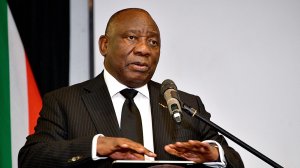The African Union (AU) will convene the third Men’s Conference on Positive Masculinity, in Pretoria this week, with the aim of advocating for more initiatives and dialogues where young men and boys can discuss issues affecting them.
President Cyril Ramaphosa noted in his weekly letter to the nation that Saturday marked the start of the 16 Days of Activism for No Violence against Women and Children yearly campaign.
He said one of the reasons gender-based violence (GBV) continued in South Africa, was because there was a culture of ambivalence among men who see crimes against women and children as a ‘private matter’ or a ‘family matter’.
In most cases of GBV, including domestic abuse and sexual violence, the attacker was known to the victim, he added.
South Africa is co-hosting the conference with the AU Chair and President of the Comoros Azali Assoumani.
The inaugural conference was held in Kinshasa in the Democratic Republic of Congo in 2021 and the second one was held in Dakar, Senegal in 2022.
Ramaphosa highlighted that it was the country’s priority to end GBV.
“For the AU, as it is for our own country, ending GBV is a priority. Discussions are currently underway on the content of an African Convention to End Violence Against Women and Girls, executing a decision of the African Union Summit earlier this year,” he said.
He explained that once adopted, the convention would be the first continental legal instrument for the prevention and elimination of all forms of violence against women and girls.
He said South Africa was part of the AU Circle of Champions.
“It is an association of African Heads of State who have committed to implementing programmes at a national and continental levels that promote positive masculinity and encourage more men and boys to be part of the fight against GBV,” he explained.
Ramaphosa expressed his confidence that the third AU Men’s Conference on Positive Masculinity would raise the profile of prevention efforts in South Africa and in wider Africa, and that its outcomes would galvanise men and boys to play a greater role in breaking the cycle of violence.
He said government had long maintained that interventions aimed at eradicating GBV in the country must focus on prevention.
“If we are to raise a nation of men who are positive role models, who take care of their families, who exhibit positive masculinity and who would not countenance hurting a woman or a girl, we must work with young men,” he said.
MORE INTERVENTIONS
Government has been engaging with civil society, academia and researchers, traditional leaders, youth organisations, the faith community and the private sector on the issue of prevention.
He said a number of initiatives were underway across a range of sectors that were providing space for young and older men to discuss notions of masculinity. Men are called on to critically consider their own prejudices, preconceptions and chauvinisms that abet GBV.
Ramaphosa noted that a number of government departments had interventions in place that were focused on promoting positive masculinity through dialogues, workshops, awareness-raising campaigns, psychosocial support and behavioural change programmes.
“In August this year I was part of the Presidential Young Men and Boys’ Indaba in Soweto. I had the opportunity to talk with a group of young men as part of the ‘What about the Boys’ initiative. The aim of this programme is to get young men to open up in a safe space about their own experiences with masculinity and how this impacts their own attitudes to GBV,” he said.
He said that citizens needed to inculcate a mindset that saw young men as part of the solution, and not just the problem.
“While men are the main perpetrators of violence against women and children, men must also be at the forefront of bringing about a new society that respects the equal rights of women and girls, where GBV has no place,” he said.
EMAIL THIS ARTICLE SAVE THIS ARTICLE ARTICLE ENQUIRY
To subscribe email subscriptions@creamermedia.co.za or click here
To advertise email advertising@creamermedia.co.za or click here











